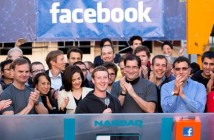Google (NASDAQ:GOOG) and Facebook (NASDAQ:FB) are the worlds’ top most websites according to Amazon’s Alexa web traffic tracker. Google (NASDAQ:GOOG)proves to be the world’s most used search engine app. Having usage of 88% Facebook (NASDAQ:FB)is the world’s top most social network with almost 1.39 billion users monthly. Both are using advertising as their main publicity, it is said that Facebook (NASDAQ:FB)is planning to disturb Google (NASDAQ:GOOG)’s eco system in a big way.
How is that going to happen? Let’s discuss the strategic planning which is the Concealed OS on Facebook (NASDAQ:FB).Facebook (NASDAQ:FB)does not have a mobile OS which most of the other corporations like Google (NASDAQ:GOOG), Apple (NASDAQ:AAPL) and Amazon (NASDAQ:AMZN) enjoy. About two years back Facebook (NASDAQ:FB)tried to build up mobile OS with Facebook (NASDAQ:FB)home.
This could be the substitution launcher for Android but the app failed and no Android device could be transformed to Facebook (NASDAQ:FB)phone app. So Facebook (NASDAQ:FB)concentrated on building an invisible OS through its connected services. Parse was bought back in 2013, an mBaaS (mobile backend as a service) that gave Facebook (NASDAQ:FB)connections certain apps including user authentication, push notifications, and data analytics on varied mobile devices and platforms.
Parse is paid highly, while it is still unsegregated with Facebook (NASDAQ:FB)app install ads in the newsfeed. Facebook (NASDAQ:FB)obtained substitution profit from app sales by charging iOS and Android developers together for News Feed ads and mBaaS subscriptions through Parse. EversinceFacebook (NASDAQ:FB)got hold of Parse, its hosted apps raised upto 500,000 from 60,000. Facebook (NASDAQ:FB)’s ecosystem is enhancing its Messenger app.
With 500 million users is turning into a podium for dedicated apps. Facebook (NASDAQ:FB)has now unveiled the payment feature of messenger which makes it at the level of eBay’s PayPalandVenmo, Square Cash, and Google Wallet.This development is going to bring Facebook (NASDAQ:FB)messenger in comparison with Tencent’s WeChat, which have developed mini-app ecosystems within Android and iOS. Facebook (NASDAQ:FB)’s SSO (single sign-on) strategy is again an impeccable development.
SSO’s are widely used by both Facebook (NASDAQ:FB)and Google (NASDAQ:GOOG)in crafting ads because traditionally cookies are not designed to follow users across devices. Now this SSO strategy is definitely holding up Google (NASDAQ:GOOG)giving it a setback. Google+,which is in competition with Facebook (NASDAQ:FB)as social network has 2.2 billion users, but mostly it has inactive accounts which were just registered in order to activate their Android devices.
Analysts believe only 9% of the account meaning 198 million people have posted something or any related content on Google+. In January 2015 just 6.6 million users were active. Facebook (NASDAQ:FB)is surely far more stretched out in social networking definitely through SSO’s. Another main technique is that Facebook (NASDAQ:FB)allows users to embed their videos on other sites like Google’s Youtube.



